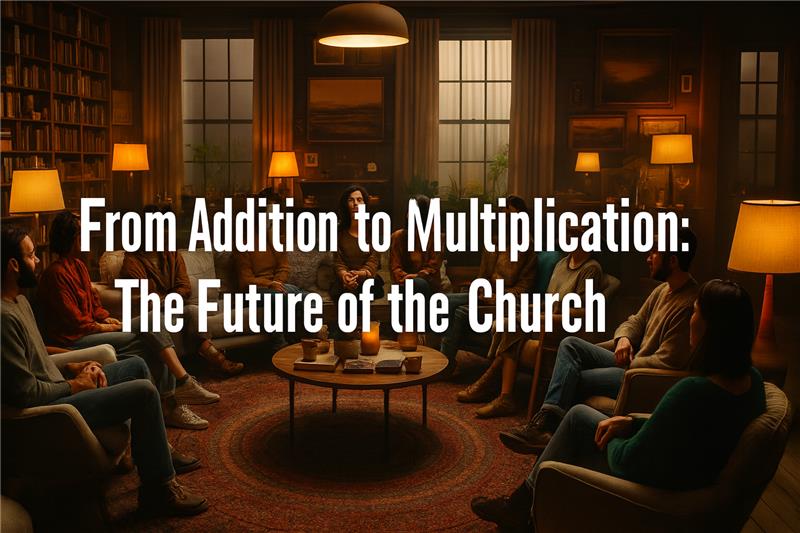Five Things We Will Learn
- Why church growth that looks like success can actually be failure.
- How the megachurch model strains leaders and resources.
- Why character formation in ministry is being bypassed in today’s instant culture.
- How government, culture, and economics are reshaping the future of church gatherings.
- Why smaller, multiplying disciple-making communities may be God’s blueprint for the future.
Rethinking Success in Church Growth
This is one of the things I feel like we’ve gotten wrong in the church. When I started my church, we quickly grew to about 50 people. With those 50, it grew to 500. I thought, “Man, that’s good, that’s good.” I mean, if I were a salesman and had 50 salesmen, and they each got 10 sales, I’d say, “Great year, guys.”
So when we had 500 people, that felt successful. Then 500 grew to 5,000. Again, I thought, “That’s cool. Those 500 people multiplied and reached out, and now we’ve got 5,000.” But once we got to 5,000, it plateaued. We didn’t go to 10,000. We just stayed around 5,000. Somewhere in there, I realized—that’s failure.
Related:
- Is It Time to Rethink Church?
- Explosive Church Growth in Cuba; Following Simple Biblical Truth
- Prophesy- Revival Coming to Cuba
- Suffering in Cuba Has Produced Massive Church Growth with no signs of Slowing Down
- Family: God’s Original Intent for the Church – It’s like the Church of Acts: dreams, visions, miracles, healings
And yet, that was the point when people started saying, “Hey, will you come speak here? Will you write this? Will you do that?” But looking back now, I realize that was failure. If you were given a sales force of 5,000 and there were no new sales, no multiplying—that’s a lot of wasted resources. With 50 people, each reaching 10, that’s great. But at 5,000, if it stalls, that’s failure.
Why? Because the name of the game is reaching the unreached and training them to become disciple-makers. But in the church world, we looked at 5,000 and said, “That’s success.” And it drove me crazy, because I didn’t know how to multiply that group. And it costs a lot of money just to keep 5,000 people showing up every week. That’s a lot of people sitting instead of multiplying. That’s a lot of money that could be used for actual disciple-making.
Now, I’m not saying it was a complete failure. Good things happened—we planted some churches, started a college, trained people, sent out missionaries. Wonderful stuff. But the main thing Jesus told us to do is multiply.
So, as I think about the future, this is just my opinion: I don’t see how the megachurch can be the model for the future.
Related:
- House Church or CHURCH that meets in the House: A Big Difference!
- Back to Basics for the Church
- Rethinking Church- Not Us and Them, Just US
- Church is an Organism, not an Organization
- Re -Thinking Church- Vision for the Outside
- Re –Thinking Church Revisited
Why the Megachurch Model Struggles
Here’s why:
Leadership pressure. I don’t know how leaders can survive it. The pressure is only going to get worse. And honestly, I don’t know how someone like me could stay humble with that much attention and flattery—or survive the depression that comes with all the criticism. It takes a very unique individual to do that.
The way leaders are formed. Back in the day, you didn’t just start speaking right away. You served first. My youth pastor is here—when I was 17, I thought I could speak, but he had me stacking chairs, discipling freshmen, cleaning bathrooms. In four years, I spoke maybe twice. But that was right. It built character. Same when I planted my first church—I was running sound, leading men’s ministry, my wife was on the worship team—we did it all. But now? You can bypass all that. Post a video, go viral, and suddenly people say, “Let’s have him speak.” Things take time, but today, everything’s instant.
The economy. Does it really look like everything’s turning around so we can keep funding huge buildings everywhere? Maybe a few will survive—and praise God—but as a model for the future? I question it.
Related:
- Re-Thinking Church – Stats say it isn’t Working
- Re-thinking Church
- Re-Thinking Church- Institutionalized, Confined, and Contented?
- Rethinking Church: We made it Up, George Barna
- Re-Thinking Church: God is a God of order but his name is not Robert
Government pressure. Look at how fast things are changing in politics and culture. Do you really think, 10–20 years from now, people like me will be allowed to stand up in front of thousands and call sin “sin” without being shut down?
So maybe this isn’t the model. Maybe instead, we need to raise up disciple-makers who know how to stand on their own two feet.
Returning to Simplicity
And please hear me—I’m not bashing anything. I’m just asking: Is it time to simplify? To focus on training people to gather in homes, raise up leaders, and multiply?
Because the truth is, most of us could lead a group of 15–20 out of our house without needing to be paid for it. We could work a normal job and still shepherd 20 people. We can’t all do 100, but we can do 20. And if 100 requires $200,000 a year, why not five groups of 20 that are free?
Related:
- Vine Seminar: Original Intent of the Church
- The Church is Good but Religion has to GO
- Acts 2:42 Vision: The Church of Acts and the Combine Harvest! “I saw Jesus face to face.” Chris Reed
- Five Keys to Spreading the Gospel: Insights from Steve Addison’s “Movements That Change the World
So I’m asking the Lord of the harvest: “God, would You send laborers? Would You help us train people to do this?”
That’s where I’m at. This Sunday, I’m starting small again. Just inviting people to my house. And I’m telling them: “We’re going to live like a family, like the body of Christ. If you hurt, I hurt. We’re going to be close. I’ll disciple you. But watch closely, because six months from now, you’re going to start your own gathering.”
And yes, it’ll hurt to multiply, to split apart. But for the sake of the mission, for the Great Commission, we have to.
The Power of Small Gatherings
I want to show people how to gather around the Word, around prayer, communion, and fellowship—not just around a speaker or a stage. Sometimes we’ve tried so hard to spice things up that we’ve missed the simplicity of the early church. Communion doesn’t need to be “special”—it’s already powerful. Breaking bread, drinking the cup, remembering Jesus—that’s powerful.
Wouldn’t it be amazing to gather in a living room, pray for one another, and send each other out in courage to share the gospel? That’s the kind of church that excites me.
Related:
- “The Church is Not Structural but Organic” Charles Simpson
- Why I Choose to Believe the Bible: A Reflection on Faith and Reason, Voddie Baucham, Greg Lancaster
- CHURCH: What is it and What is it’s Purpose? God’s Original Intent?
- Family: God’s Original Intent for the Church
- Family: God’s Original Intent for the Church – It’s like the Church of Acts: dreams, visions, miracles, healings
Because the goal isn’t to keep everyone together forever. Just like with my daughter—she’s about to graduate, and I have to prepare her to go. That’s how I see pastoring now. My role is to prepare people to go, not to keep them here.
And honestly? If my giant building burned down tomorrow, we’d have to figure out another way anyway.




